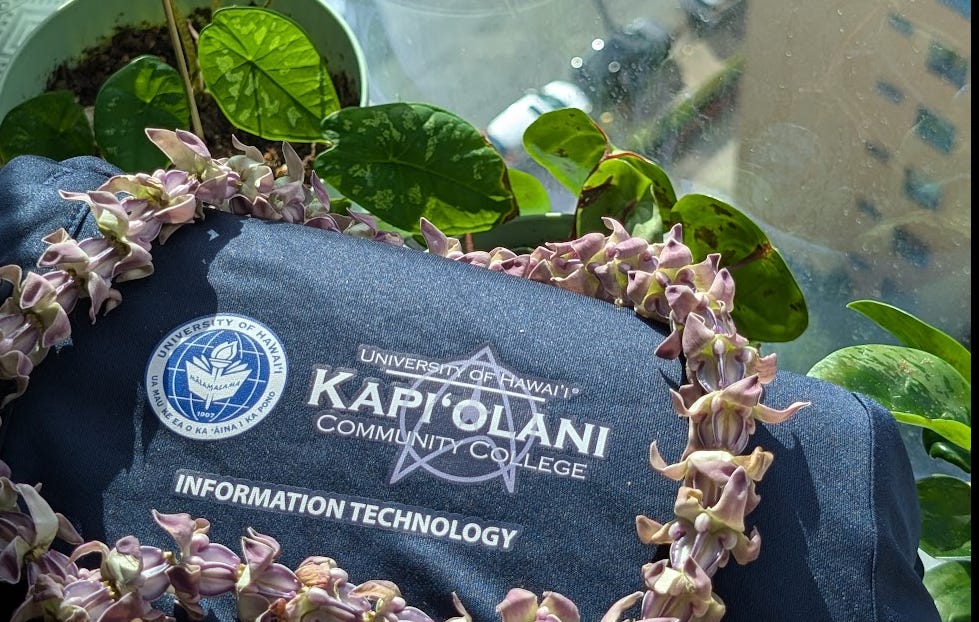Beijing Just Mandated AI Training for Every Student Age Six and Up.
But Hawaii’s Already Showing the World How It’s Done.
Starting in September 2025, Beijing will require every primary and secondary school student, some as young as six, to receive formal training in artificial intelligence. Under the new policy, students will spend at least eight hours per year learning about AI basics, ethics, chatbots, and real-world applications. Schools have the option to integrate this curriculum into subjects like science or IT, or to offer it as a standalone course.
This isn’t just another education reform, it’s a strategic move by China to dominate the next era of global innovation.
The Economic Times:
"China has begun training six-year-olds in artificial intelligence, aiming to cultivate future tech leaders like DeepSeek’s Liang Wengfeng. The initiative... seeks to embed AI literacy early to foster innovation."
(Source: China starts training six-year-olds in AI)
South China Morning Post:
"Chinese universities are rapidly expanding AI courses and research projects, reflecting a top-down push to dominate the field. This K-12 initiative aligns with Beijing’s goal to build a 'holistic AI talent pipeline' from childhood to higher education."
(Source: Push to develop AI)
Fortune:
"The Beijing Municipal Education Commission emphasized a 'teacher-student-machine' model, where AI tools assist educators in delivering personalized learning. The policy also includes plans for multi-year curricula and cross-school collaboration."
(Source: China’s AI education push)
Countries like Singapore, Finland, and Estonia have prioritized AI ethics and computational thinking in their elementary schools. South Korea and Canada are pouring millions into AI research labs and teacher training programs.
The World Economic Forum has issued a clear warning:
“Nations that fail to integrate AI education risk falling behind in the Fourth Industrial Revolution.”
But amidst this global sprint to modernize education, something remarkable is unfolding in a place you might not expect: Hawaii.
Without a national mandate or billion-dollar initiative, educators, students, nonprofits, and even legal professionals across the islands are leading the charge to make AI literacy accessible, ethical, and locally grounded.
Hawaii’s Quiet AI Revolution
From Honolulu to Hilo, educators, students, and professionals are experimenting, reflecting, and adapting AI in real-time. Thousands of teachers across the state have now received AI training. Unlike Beijing’s top-down model, Hawaii’s AI progress is being shaped by passionate educators, community advocates, and localized workshops designed for relevance and cultural sensitivity.
Real Stories, Real Progress
Education: Building AI Literacy from the Ground Up
Across Hawaii, schools are proving that AI education doesn’t have to wait for federal policy.
At the school I teach at, every 7th grader now receives formal AI literacy instruction that includes hands-on work with tools like MagicSchool. The school also launched a student-led Digital Literacy Ambassadors (DLA) program and developed a faculty-led peer mentorship model to support discipline-specific integration of AI tools. Parent education nights have extended the conversation into the home, promoting whole-community awareness.
Hongwanji Mission School hosted AI training sessions for faculty, creating a safe space for teachers to explore generative tools, discuss ethics, and reflect on the shifting boundaries of classroom instruction.
At the Asia Pacific International School (APIS), workshops focused on integrating AI into both humanities and STEM courses, with an emphasis on preparing students for emerging career paths.
Kapiʻolani Community College’s Aloha Club introduced AI tools through a university-sponsored workshop that emphasized responsible use, ethics, and hands-on exploration of accessible platforms.
The University of Hawaiʻi at Mānoa’s Shidler College of Business ran “AI 101” workshops for business students and faculty, connecting generative tools to real-world applications in marketing, entrepreneurship, and operations.
Through STEMworks Hawaii, both students and teachers across Maui, Molokaʻi, and Hawaiʻi Island engaged in AI summer camps and STEMday trainings. These sessions emphasized student voice, ethics, and creative applications such as game design, chatbots, and digital art.
Nonprofits & Community Organizations: Empowering Local Leaders
AI is also finding a place in Hawaii’s nonprofit and community work.
The Association of Fundraising Professionals (AFP) Aloha Chapter convened over 150 nonprofit leaders for a focused “AI 101” lunch-and-learn, spotlighting tools to assist with grant writing, donor outreach, and storytelling.
ʻŌlelo Community Media explored how AI can support public-access media through translation, captioning, and multilingual scripting—equipping content creators with tools that expand access and reach.
The Filipino Community Center (FilCom) organized an intergenerational AI workshop that introduced youth and seniors to chatbots, storytelling tools, and ethical discussions around technology and identity.
Organizations like Shangri La have begun exploring how AI intersects with cultural preservation and education—particularly as it relates to data ethics, indigenous sovereignty, and digital storytelling.
Professional Sectors: Future-Proofing Hawaii’s Workforce
Dozens of professional associations have begun AI training initiatives to prepare for industry-wide change.
The Hawaii State Bar Association led multiple AI sessions through its Business Law and Senior Counsel divisions, highlighting productivity tools, document review, and the legal and ethical implications of AI-generated content.
The Hawaii Employers Council and HEMIC (Hawaii Employers’ Mutual Insurance Company) hosted workshops focused on AI use in human resources, training their teams on how to mitigate bias in hiring, streamline evaluation processes, and improve compliance documentation.
AI education has even reached specialized sectors like home inspectors and veterinarians, with tailored workshops on client communication, data analysis, and recordkeeping.
Innovation & Industry: Hawaii as a Testbed for AI in Action
AI isn’t just being explored in classrooms and boardrooms—it’s also part of Hawaii’s innovation sector.
At East Meets West, the state’s flagship startup and innovation conference, the session “Postcards from the Future of Hawaii” encouraged local leaders to imagine how AI could support more equitable, community-driven futures.
Private sector organizations like Dowling Co. brought AI training in-house to support design and development teams, while larger industry players such as FlintAI and Google Labs have partnered with educators in Hawaii to pilot new tools and frameworks.
Presentations at national conferences like ISTE San Antonio and Schools of the Future 2024 showcased how Hawaii’s educator-led efforts are helping set the tone for ethical, culturally responsive AI literacy across the U.S.
If you're in Hawaii and haven’t yet taken that first step into AI, now is the time. From Beijing to Berlin, the world is moving fast—and Hawaii has proven that you don’t need a national mandate or massive tech budget to lead. All it takes is a committed team and the right guidance.
Over the past year, we’ve helped thousands of educators, nonprofit leaders, and students across Hawaii become confident, ethical users of AI. These aren’t generic tech trainings—they’re hands-on, locally relevant, and tailored to your field, whether you're in education, law, fundraising, or business.
So here’s the question:
Is your team ready to keep pace?
If your school, organization, or department wants to explore what AI can do—and how to do it safely, ethically, and effectively—let’s talk.
📩 Email me directly at gabrielyanagihara@gmail.com
🔗 Or share this article with a decision-maker who can help bring this training to your community.
Workshops are now booking for Summer and Fall 2025. Let’s build Hawaii’s AI future—together.








